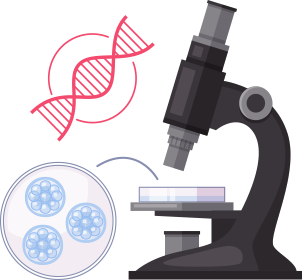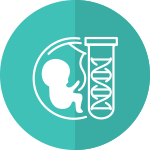Next Generation Sequencing before embryo implantation has been widely adopted due to its contribution in increasing the success rate of pregnancy. Many couples have experienced failures in in vitro fertilization without knowing the cause. Therefore, experts speculate that over half of the failures could potentially be attributed to embryo quality, incomplete cell division, or genetic abnormalities not visible to the naked eye.
Therefore, Next Generation Sequencing by specialized medical professionals and scientists before embryo implantation undoubtedly enhances the chances of successful pregnancy. This thorough examination delves into the chromosomal level, identifying any abnormalities that could hinder further development. This also includes determining the sex of the embryo, whether it is male or female.


Who has indications for genetic screening?
- Those who have undergone unsuccessful in vitro fertilization (IVF) without a known cause.
- Women with a history of recurrent miscarriages.
- Women aged over 38 years.
- Women who have experienced pregnancies with chromosomal abnormalities before, such as Down syndrome.
The method of genetic screening:
Preimplantation Genetic Diagnosis (PGD) is a method used to screen for genetic disorders. It enables the screening of all 5 pairs of chromosomes out of the 23 pairs. These include chromosome pairs 13, 18, 21, X, and Y.
Microarray is another method used for genetic screening. However, it differs from PGD in that this method can screen all 23 pairs of chromosomes. As a result, the success rate of treatment using this method is relatively high.












